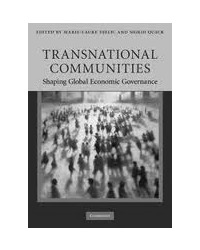New Book

Transnational Communities
Shaping Global Economic Governance
Marie-Laure Djelic and Sigrid Quack
Shaping Global Economic Governance
Marie-Laure Djelic and Sigrid Quack
Transnational communities are social groups that emerge from mutual interaction across national oundaries, oriented around a common project or 'imagined' identity. This common project or identity is
constructed and sustained through the active engagement and involvement of at least some of its members. Such communities can overlap in different ways with formal organizations but, in principle, they do not need formal organization to be sustained. This book explores the role of transnational communities in relation to the governance of business and economic activity. It does so by focusing on a wide range of empirical terrains, including discussions of the Laleli market in Istanbul, the institutionalization of private equity in Japan, the transnational movement for open content licenses, and the mobilization around environmental certification. These studies show that transnational communities can align the cognitive and normative orientations of their members over time and thereby influence emergent transnational governance arrangements.
'Djelic and Quack have assembled an outstanding volume … It will be the key point of reference in the field for some time to come.'
David Held, London School of Economics and Political Science
List of figures; List of tables; List of appendices; List of contributors; Preface; Part I. Introduction: 1. Transnational communities and governance; 2. Global structures: markets, organizations, networks – and communities?; Part II. Classical Communities with a Transnational Extension: 3. The multiple layers of a transnational 'imagined community': the notion and reality of the ethnic Chinese business community; 4. From cross-border exchange networks to transnational trading practices? The case of shuttle traders in Laleli, Istanbul Mine Eder and Özlem Öz; Part III. Professional Communities with a Transnational Extension: 5. Transnational boards and governance regimes: a Franco-British comparison; 6. Private equity in Japan: global financial markets and transnational communities; 7. Formal organizing and transnational communities: evidence from global finance governance associations, 1879–2006; 8. Promoting transnational professionalism: forays of the 'Big Firm' accounting community into France; Part IV. Virtual Communities: 9. Gift-giving, transnational communities, and skill building in developing countries: the case of free/open source software; 10. Epistemic communities and social movements: transnational dynamics in the case of Creative Commons; Part V. Transnational Interest or Issue-Based Communities: 11. The transnational temperance community; 12. Industrial democracy in the European Community: trade unions as a defensive transnational community, 1968–88; 13. The making of a comprehensive transnational discourse community; 14. Global warming, transnational communities and economic entrepreneurship: the case of carbon capture and storage (CCS); 15. Communities of practice as cause and consequence of transnational governance: the evolution of social and environmental certification; Part VI. Conclusion: 16. Transnational communities and their impact on the governance of business and economic activity; Index.
20% discount with this flyer – order before 1st December 2010
20% discount with this flyer – order before 1st December 2010
May 2010 448pp
Hardback 9780521518789 £65.00 £52.00
For more information please visit us at www.cambridge.org/9780521518789
constructed and sustained through the active engagement and involvement of at least some of its members. Such communities can overlap in different ways with formal organizations but, in principle, they do not need formal organization to be sustained. This book explores the role of transnational communities in relation to the governance of business and economic activity. It does so by focusing on a wide range of empirical terrains, including discussions of the Laleli market in Istanbul, the institutionalization of private equity in Japan, the transnational movement for open content licenses, and the mobilization around environmental certification. These studies show that transnational communities can align the cognitive and normative orientations of their members over time and thereby influence emergent transnational governance arrangements.
'Djelic and Quack have assembled an outstanding volume … It will be the key point of reference in the field for some time to come.'
David Held, London School of Economics and Political Science
- First book to fully explore the role of transnational communities in relation to issues of economic governance
- Includes a wide range of case studies featuring transnational communities in and across a number of different countries
- Written by an international team of contributors from Europe and North America
List of figures; List of tables; List of appendices; List of contributors; Preface; Part I. Introduction: 1. Transnational communities and governance; 2. Global structures: markets, organizations, networks – and communities?; Part II. Classical Communities with a Transnational Extension: 3. The multiple layers of a transnational 'imagined community': the notion and reality of the ethnic Chinese business community; 4. From cross-border exchange networks to transnational trading practices? The case of shuttle traders in Laleli, Istanbul Mine Eder and Özlem Öz; Part III. Professional Communities with a Transnational Extension: 5. Transnational boards and governance regimes: a Franco-British comparison; 6. Private equity in Japan: global financial markets and transnational communities; 7. Formal organizing and transnational communities: evidence from global finance governance associations, 1879–2006; 8. Promoting transnational professionalism: forays of the 'Big Firm' accounting community into France; Part IV. Virtual Communities: 9. Gift-giving, transnational communities, and skill building in developing countries: the case of free/open source software; 10. Epistemic communities and social movements: transnational dynamics in the case of Creative Commons; Part V. Transnational Interest or Issue-Based Communities: 11. The transnational temperance community; 12. Industrial democracy in the European Community: trade unions as a defensive transnational community, 1968–88; 13. The making of a comprehensive transnational discourse community; 14. Global warming, transnational communities and economic entrepreneurship: the case of carbon capture and storage (CCS); 15. Communities of practice as cause and consequence of transnational governance: the evolution of social and environmental certification; Part VI. Conclusion: 16. Transnational communities and their impact on the governance of business and economic activity; Index.
20% discount with this flyer – order before 1st December 2010
20% discount with this flyer – order before 1st December 2010
May 2010 448pp
Hardback 9780521518789 £65.00 £52.00
For more information please visit us at www.cambridge.org/9780521518789
9/30/10